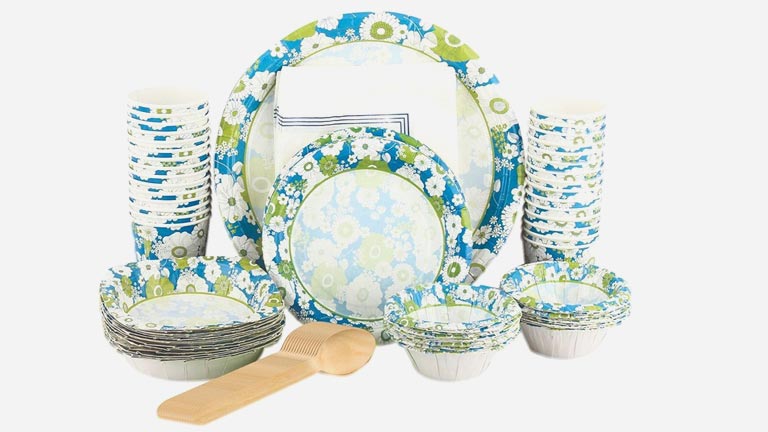
The food service industry has radically transformed its use of disposable dinnerware. What once began as a quest for the most cost-efficient, easy-to-use products has blossomed into an era where sustainability takes center stage. Today’s consumers, increasingly environmentally savvy, are rejecting the traditional polystyrene and plastic disposables of yesteryear in favor of disposable dinnerware that is both planet-friendly and convenient.
The inception of disposable dinnerware dates back to a time when convenience was paramount, and environmental implications were an afterthought. These products provided a quick and easy way to serve food without the hassle of cleanup. As society’s understanding of environmental stewardship has expanded, so has the demand for disposables that align with these values. Businesses and individuals are now advocating for products that offer ease of disposability without leaving an indelible mark on the environment.
Yet the adoption of eco-friendly alternatives is more than a statement of environmental consciousness; it is a crucial pivot towards a more sustainable lifestyle. By comprehensively understanding the past and present of disposable dinnerware, consumers can better appreciate the benefit of this shift. This article delves deep into the evolution of disposable tableware, exploring the various materials, the growing appetite for sustainable products, and the future direction of this essential industry niche.
The Rise of Eco-Consciousness in Food Service
In recent years, a groundswell of eco-consciousness has reshaped industries across the globe. The food service industry, in particular, has been a focal point in the dialogue about sustainability and environmental responsibility. Restaurants, catering services, and event planners are now measured by their offerings’ quality and commitment to environmental stewardship. This ethical imperative is reflected in the growing popularity of sustainably sourced ingredients, energy-efficient operations, and, perhaps most notably, eco-friendly disposable dinnerware.
Media coverage and research have played a vital role in educating the public about the detrimental impacts of non-biodegradable disposables. This has led to a consensus that the convenience of traditional disposables, such as disposable dinnerware, can no longer justify the environmental damage they cause. Businesses are being lauded not just for their quality of service but for adopting sustainable food service practices. A shift is underway, carved out by growing consumer demand and the ethical impetus to preserve the planet for future generations.
Materials Used in Disposable Dinnerware
The disposable dinnerware of yesterday was predominantly crafted from plastics and polystyrene, materials praised for their durability and cost-effectiveness. However, the environmental toll of these materials – their non-biodegradability and the pollution associated with their production – has cast a long shadow over their convenience. As a response, the industry is redirecting its focus to materials that are kinder to the earth. Innovations in biodegradable and compostable materials lead this charge, offering a promising alternative to their plastic predecessors.
The options now available are as diverse as they are eco-friendly. Companies are exploring techniques to harness plant fibers – like bagasse from sugarcane and fibers from bamboo and wheat – to create sturdy and compostable dinnerware. Even more groundbreaking, some innovators are pioneering mycelium, cultivated from fungal networks, to bind agricultural byproducts into a durable, earth-friendly product. Consumers are no longer forced to choose between a clean conscience and convenience; the materials revolution within disposable dinnerware means they can have both.
The Benefits of Switching to Sustainable Disposable Dinnerware
The transition to sustainable disposable dinnerware is an environmental imperative and an intelligent business decision. The benefits of this shift ripple outwards, impacting various facets of the ecosystem and economy. On an ecological level, sustainable disposable dinnerware reduces the dependence on non-renewable resources and minimizes the volume of waste in landfills or the ocean. Often made from renewable materials, these products can biodegrade or be composted, significantly lessening their environmental footprint.
Forward-thinking businesses that pivot towards eco-friendly disposables frequently find that the move enhances their public image, setting them apart from competitors and strengthening their market position. This strategic differentiation can lead to increased customer loyalty from environmentally conscious consumers. From a practical standpoint, sustainable disposables are often lighter and require less storage space, potentially lowering transport and warehousing costs. Over time, these factors can contribute to substantial financial savings, highlighting the economic viability of investing in sustainability.
Innovations in Eco-Friendly Disposable Products
The panorama of disposable dinnerware is changing and a sight to behold. Innovations in this space are pioneering a new era where eco-friendliness doesn’t trade off with aesthetic appeal or functionality. Designers and manufacturers are teaming up to create disposables that look and feel premium, boasting a variety of styles and themes that can cater to any taste or occasion. Cutting-edge, eco-friendly disposable products are setting a new standard, combining practicality with a conscientious approach to consumerism. Whether it’s elegant dinnerware for a high-end event or sturdy options for casual dining, eco-friendly disposables now offer a look and quality that rivals traditional options.
From the drawing board to dining tables, innovations such as water-based coatings that repel moisture without damaging the environment or plant-based plastics that mirror traditional plastic’s convenience without the ecological downsides are trailblazing a promising path forward. There’s a concerted effort to reduce waste at the consumer end and throughout the product’s lifecycle, considering every aspect from manufacturing to disposal. Novel techniques like 3D printing with biodegradable materials are on the horizon, promising a customized and sustainable solution for disposable dinnerware needs.
How Consumers Can Make a Difference
The influence of consumers on industry trends cannot be overstated. Individuals can send a powerful message about their priorities and values by purchasing and using eco-friendly disposable dinnerware. In a market-driven economy, consumer preferences can be a driving force for change. Sustainability-oriented purchases can create a demand that encourages more businesses to produce and market eco-friendly options, fostering a virtuous cycle that benefits the environment and society.
Alas, navigating the world of eco-friendly products can be challenging without a proper understanding of the labeling and certifications. Various labels signify different levels of environmental responsibility. Certifications such as the Biodegradable Products Institute (BPI) label assure the consumer of the compostability of products, distinguishing them from less eco-friendly alternatives. By educating themselves and making choices that align with sustainability, consumers can take active roles in supporting and expanding the market for disposable dinnerware that places a premium on ecological health.
The Role of Legislation in Promoting Sustainable Alternatives
Legislation can be a powerful engine for change, propelling industries towards more sustainable practices. Governments have the unique ability to enact laws that encourage the production and consumption of eco-friendly disposables. Restrictions against single-use plastics in many regions have led to a surge in demand for alternatives that can legally fill the void. This legal impetus combines with consumer demand to create a market where eco-friendly options are available, economically viable, and socially responsible.
Government incentives, such as tax breaks or subsidies for businesses that reduce their environmental impact, can promote a more rapid adoption of green products. These incentives not only make it more affordable for companies to switch to sustainable disposables but also signal an official endorsement of these products, legitimizing them in the eyes of consumers and further stoking demand.
Challenges and Limitations of Eco-Friendly Disposables
The journey to widespread adoption of sustainable disposable dinnerware is fraught with challenges. One of the main barriers is cost. Even as the production of eco-friendly materials becomes more efficient, these products often come with a higher price tag than their less sustainable counterparts. However, balancing this upfront cost against the long-term environmental savings and the potential for reduced waste management fees is essential.
Another hurdle is overcoming misconceptions about less durable or convenient green disposables than traditional ones. Education campaigns and transparency about product quality and life cycle impacts are imperative to alleviate these concerns. Only by demystifying the attributes and benefits of sustainable disposable dinnerware can the industry hope to overcome skepticism and drive adoption.
Case Studies: Success Stories in Sustainable Disposables
Amidst the growing sea of businesses adopting green practices, some stand out for their commitment to sustainable disposables. Restaurants are switching to biodegradable to-go containers, event planners are using compostable plates and cutlery, and coffee chains are introducing recyclable cups, all of which have shown that what is good for the environment can also be good for business. These enterprises not only reduce their ecological impact but often see a boost in their brand’s reputation, experiencing growth through positive consumer response and increased loyalty.
Such case studies exemplify how sustainable practices can lead to tangible benefits, including cost savings, customer satisfaction, and an enhanced brand image. The lesson is clear: Investing in eco-friendly disposable dinnerware is not just a corporate responsibility but a strategic business advantage.
Looking Ahead: The Future of Disposable Dinnerware
The future of disposable dinnerware hinges on the harmonious integration of convenience and sustainability. Industry trends predict a burgeoning market for disposables that satisfy both demands. Stakeholders across the supply chain, from raw material suppliers to manufacturers and end-users, are reimagining the potential of disposables – a future where eco-friendliness is embedded in every product.
This future is not just a romantic vision but a practical inevitability shaped by consumer behavior, technological innovation, and regulatory frameworks. Thoughtful analysis and informed predictions, as seen in resources like the anticipated innovations in disposable dinnerware, indicate much to look forward to. The synergy between consumer demand, legislative support, and industry innovation paves the way for a world where disposable dinnerware harmonizes with ecological values, ensuring that our environment is preserved for future generations.




